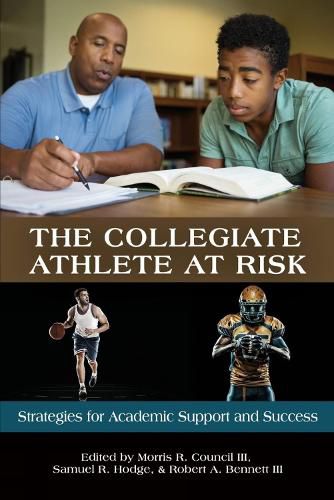Readings Newsletter
Become a Readings Member to make your shopping experience even easier.
Sign in or sign up for free!
You’re not far away from qualifying for FREE standard shipping within Australia
You’ve qualified for FREE standard shipping within Australia
The cart is loading…






This title is printed to order. This book may have been self-published. If so, we cannot guarantee the quality of the content. In the main most books will have gone through the editing process however some may not. We therefore suggest that you be aware of this before ordering this book. If in doubt check either the author or publisher’s details as we are unable to accept any returns unless they are faulty. Please contact us if you have any questions.
There are numerous books documenting the challenges of student athletes and presenting recommendations for academic success. They primarily focus on understanding the issues of student-athletes and recommendations are oftentimes overly simplistic, failing to explicitly provide interventions that can be executed by student-athlete support personnel. In addition, the topic of supporting student-athletes who are academically at risk and/or are diagnosed with high incidence disabilities has been overlooked by scholars resulting in few publications specifically focusing on providing strategies to the staff/personnel who serve these populations. The general target audience is college/university practitioners who interface with student-athletes who demonstrate academic and social risk in the realm of athletics.
These stakeholders include but are not limited to: academic support staff, student athletes, parents, coaches, faculty/educators, counselors, psychologists, higher education administrators, student affairs professionals, disability services coordinators/personnel, as well as researchers who focus on education leadership, sports, and special education. All of these groups are likely to find this book attractive especially as they work with student-athletes who are at-risk for academic failure. Also, it is ventured that this book will become the staple text for the National Association of Academic Advisors (N4A), the official organization for all personnel who work in collegiate academic support and can be used by members of intercollegiate athletic associations to reform policies in place to support at-risk student-athletes.
$9.00 standard shipping within Australia
FREE standard shipping within Australia for orders over $100.00
Express & International shipping calculated at checkout
This title is printed to order. This book may have been self-published. If so, we cannot guarantee the quality of the content. In the main most books will have gone through the editing process however some may not. We therefore suggest that you be aware of this before ordering this book. If in doubt check either the author or publisher’s details as we are unable to accept any returns unless they are faulty. Please contact us if you have any questions.
There are numerous books documenting the challenges of student athletes and presenting recommendations for academic success. They primarily focus on understanding the issues of student-athletes and recommendations are oftentimes overly simplistic, failing to explicitly provide interventions that can be executed by student-athlete support personnel. In addition, the topic of supporting student-athletes who are academically at risk and/or are diagnosed with high incidence disabilities has been overlooked by scholars resulting in few publications specifically focusing on providing strategies to the staff/personnel who serve these populations. The general target audience is college/university practitioners who interface with student-athletes who demonstrate academic and social risk in the realm of athletics.
These stakeholders include but are not limited to: academic support staff, student athletes, parents, coaches, faculty/educators, counselors, psychologists, higher education administrators, student affairs professionals, disability services coordinators/personnel, as well as researchers who focus on education leadership, sports, and special education. All of these groups are likely to find this book attractive especially as they work with student-athletes who are at-risk for academic failure. Also, it is ventured that this book will become the staple text for the National Association of Academic Advisors (N4A), the official organization for all personnel who work in collegiate academic support and can be used by members of intercollegiate athletic associations to reform policies in place to support at-risk student-athletes.